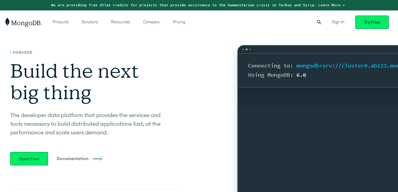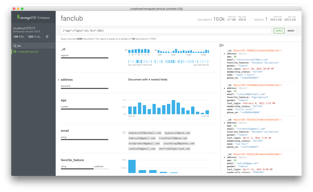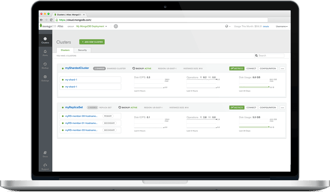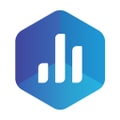

Unclaimed: Are are working at MongoDB ?
MongoDB Reviews & Product Details
MongoDB is a NoSQL database that supports scalable, and high-performance data storage solutions. The platform’s automatic sharing features combined with real-time analytics and horizontal scalability empower businesses with efficient data management.

| Capabilities |
API
CLI
OSS
|
|---|---|
| Segment |
Small Business
Mid Market
Enterprise
|
| Deployment | Cloud / SaaS / Web-Based, Desktop Mac, On-Premise Linux, On-Premise Windows |
| Training | Documentation |
| Languages | English |




Compare MongoDB with other popular tools in the same category.

Able to manage data especially NoSql data.
Sometimes it crashes automatically and take a lot of memory.
Able to manage, analyze and handle data efficiently.
MongoDB has easy integrations and well-defined and thoroughly explained documentation and libraries. This makes almost everything for a NoSQL developer easy to use. MongoDB provides well-structured functionalities to connect schemas and data variables, making it unique to use.
MongoDB has high memory usage even for low data storage, which makes it doubtful to use for large-scale projects.
I have been doing small-scale projects which need a DB and for it to tackle situations of database management and for it MongoDB has been my best companion to manage the data. Its usage with efficient functions and features are top notch.
It is a Highly Flexible and scalable No Sql database that offers fast performance and a rich query language with its document-based data structure it allows for easy handling of complex data models and adapts well to changing business requirements its built in replication and high avilability features ensure data redundancy and fault tolerance. Mongo DB's active community and vast ecosystem make it a popular choice for developers and organization looking for a powerful versatile database solution.
while numerous adavantages, does have some potential drawbacks to consider. These include a learning curve for mastering advanced features, the lack of transaction support for complex analytics, and limitations support for complex analytics, and limitations and limitations in the free community edition. It is crucial to carefully assess these factors un relation to your specific needs and use case before deciding if Mongodb is the right database solution for your project.
It addresses the problem of solving managing. big data and provide a powerful and versatile database solution for businesses.
Ease of Use: If you use Mongodb in any project this is useful for relationships suppose you are creating an e-commerce website it is useful because there is no table-like database it stores only the data you want suppose you are creating an electronic collection so if you are using MongoDB so it contains data in json format and it consumes less space and much faster. Ease of Implementation : If you implement this into your project so that JSON format is straightforward to view, read, and write because this is similar to javascript syntax and it consumes less space and is faster and you can store data by creating schema and that relationship is also great and less coding. Number of Features : MongoDB provides a few tools: MongoDB Compass Mongo Atlas for using Online through MongoURI Mongo Terminal Ease of Integration : If you integrate this into in your project so there is module so you can install that module and you can easily integrate this with your any backend project and anywhere
So the dislike thing is you can easily store data without creating any schema and there is not default validation if you want to use validation so you have to create additionally but in the MySQL there is default validation no duplicate data will store in database but in the MongoDB there is nothing to validate but if you want to validate something so you have to use required true and so many things.
For Relationship, we can easily connect so many collections using mongoose.schema.types('collection_name') so this is a very useful MongoDB solving for us.
mongo db is more relialbe database in industry , it provides more scalable feature in databse storage. and decribe the proper steps in data which solve the query by juct in the time.
there is nothing dislike about mongoDb while using day to day in compny
mongodb solving the issue related to the policy's user bought . there information related to the policy they bought, . also solving the issue occuring the which is the stage policy stuck. that benefiting us to find exact problem of the decument or stage stuck
Ease of use, performance, scalability, architecture, ease of integration
The only topic I do not like is the comand line: very hard at the first to understand the commands!
To support the management of million of images and document on a Oracle database
MongoDB's features and performance and their continuous Development of improvements
MognoDB Compass which is very basic tool compared to Studio 3t/Robo 3t
We were able to replace Oracle/MS SQL in many places
Flexible Schema - In MongoDB we don't have to think about proper schema (unlike SQL databases) during application building, as our needs change we can add properties to schema. Fast scanning in big collections- MongoDB stores data in a binary format that why its query executes very fast even in nested searches.
Infinite loop error- due to collections relations, while saving or updating data in another collection it gets stuck in an infinite loop. Ram Size error- While doing a query on a large dataset, it gives an aggregate pipeline size error.
In our company, we work with flexible data from client databases. Therefore, we cannot determine the schema in advance. This led us to choose a NoSQL database, specifically MongoDB.
The data is easily manageable and storing the data is also very easy using MongoDB.
I am working on this software from last 1year and not facing a single issue in it.
It is solving the issue of storing the large data and checking it in one click. Sharing the data with anyone also beneficial for me.
ease of installation and configuration and I can solve everything by code, be it C#, Node.js, Python or another, in addition to speed and scalability
It's not that I don't like it, but working with transactions is a little more complicated, but it works well
Performance and working with data from multiple sources and different formats, with no defined standard
